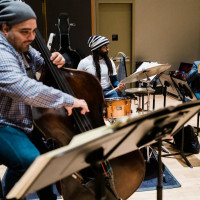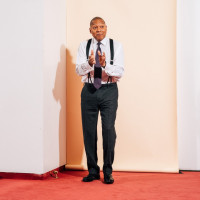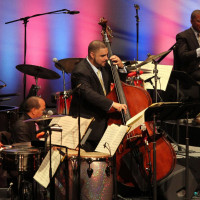-
Jazz at Lincoln Center Reopens, With Four Young Players in the Spotlight

The Jazz at Lincoln Center Orchestra was amused as four trumpet players, all under the age of 30, took their position in the rehearsal room late Tuesday morning. “It’s the Young Lions!” called out the baritone saxophone player Paul Nedzela, referring to the coterie of sharp-dressed, tradition-minded bop up-and-comers who rose during the Reagan and Clinton administrations while edging jazz toward a concert art with a classical-music-style repertoire. Keep reading »
-
Wynton Marsalis Finds Solace in the Optimism of the Blues
Marsalis, the artistic director of Jazz at Lincoln Center, puts his late father, Ellis Marsalis Jr., as well as Frederick Douglass and young musicians on his list of what’s important. Keep reading »
-
Wynton Marsalis Lets the Orchestra Shine in His Violin Concerto
A new recording captures this 2015 work, which doesn’t depend on the presence of him or his jazz colleagues. At the turn of the 21st century, Wynton Marsalis was busy. Keep reading »
-
Affordable Music for the Family in NYC? Try a Jazz Club
New York has long been a city known for jazz. What’s less well-known is how kid- and family-friendly jazz performances here can be. Many performers have day jobs as educators, and although many venues are nightclubs, there are jazz performances where even toddlers are welcome. Keep reading »
-
Wynton Marsalis Provokes Again With Head-Scratching ‘Ever Fonky Lowdown’
It had been a while since Wynton Marsalis — the famously provocative trumpeter and Jazz at Lincoln Center patriarch — had stirred controversy on the level that he did in May. Keep reading »
-
At 30, What Does Jazz at Lincoln Center Mean?
When the curtain rises on Thursday on the opener of Jazz at Lincoln Center’s 30th season, its flagship orchestra will debut arrangements of Jelly Roll Morton’s compositions, some of which are a century old. That’s no surprise: The organization has never wavered from its commitment to jazz’s thickest roots. Keep reading »
-
Review: Wynton Marsalis’s Urban Symphony for the Philharmonic

The next time Wynton Marsalis writes a symphony for the New York Philharmonic, he might want to plan from the start to keep it well under an hour. At least if he wants to assure that the Philharmonic will be able to perform it complete. Timing was a factor in 2010, when Alan Gilbert led the American premiere of Mr. Marsalis’s Symphony No. 3, “Swing Symphony,” on a season-opening gala program. Because it was being televised on “Live From Lincoln Center,” the concert had to come in under two hours. So Mr. Gilbert dropped the first of Mr. Marsalis’s six movements, which still left some 45 minutes of music. (The symphony was performed in full the following season, and then again, with yet another movement added, in 2013.) Keep reading »
-
Jazz at Lincoln Center and Rockefeller Foundation Pair Up for School Tour
Jazz at Lincoln Center and the Rockefeller Foundation have announced a new education outreach program for students in disadvantaged schools. The program, “Jazz for Young People: The Resilient Cities Tour,” will connect live jazz performances to an American history curriculum, reaching 60 schools in five cities: Chicago; New Orleans; St. Louis; San Juan, P.R.; and Sydney, Australia. Keep reading »
-
Wynton Marsalis’s ‘Spaces,’ a Kinetic Series of Zoological Portraits
The kazoos cropped up in the 10th and final movement of “Spaces,” an episodic suite by Wynton Marsalis that had its world premiere at the Rose Theater on Friday. The Jazz at Lincoln Center Orchestra was swinging light and fast as it happened, bzz-bzz-bzz-bzz-bzz, in a busy rush. It was a cute and clever flourish, in a piece titled “Bees Bees Bees.” And it was also an act of evocation that reflected the larger theme of the suite. Keep reading »
-
Carlos Henriquez Radiates Gratitude in a South Bronx Homecoming

Nearly every note from Carlos Henriquez, the bassist for the Jazz at Lincoln Center Orchestra, is cool, clear, judicious, full of body and intent. His sound doesn’t grasp or rush; informed by the economy of Afro-Latin tumbao bass patterns, it connects and assists. It has its moral priorities straight. Keep reading »
